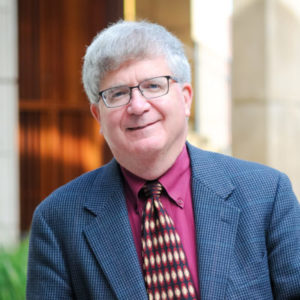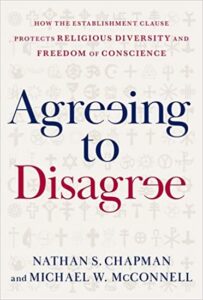New Book from SLS’s Michael McConnell Argues the Establishment Clause Should Promote Pluralism, not Secularism
The Establishment Clause of the First Amendment, “Congress shall make no law respecting an establishment of religion,” has inspired two centuries of political debate and reams of case law. A new book co-authored by Stanford Law School’s Michael McConnell adds to the often-fraught discussion with a deep dive into what the Founders envisioned when drafting the Establishment Clause—and how that vision can promote religious freedom and diversity in contemporary America.

McConnell is the Richard and Frances Mallery Professor and Director of the Constitutional Law Center at Stanford Law School, a Senior Fellow at the Hoover Institution, and a former Judge on the United States Court of Appeals for the Tenth Circuit. He co-authored Agreeing to Disagree: How the Establishment Protects Religious Diversity and Freedom of Conscience with University of Georgia School of Law Professor Nathan Chapman. The book—which McConnell says was 20 years in the making—was published by Oxford University Press in June.
Widely recognized as one of the country’s foremost advocates for and scholars of religious liberty, McConnell recently received the Canterbury Medal from The Becket Fund for Religious Liberty. The award is the group’s highest honor for an individual “who embodies an unfailing commitment to religious freedom.”
Here, McConnell discusses some of the key arguments in Agreeing to Disagree, including why he thinks too many “separation of church and state” arguments have misconstrued the Establishment Clause’s original intention for a religiously pluralistic society.
What are your central arguments in Agreeing to Disagree and what are some of the key points you hope readers will glean from the book?
The Establishment Clause, probably more than any other provision of the Constitution, has been at the center of many of our modern culture wars debates. It specifically pertains to religion, but in a broader philosophical sense, it has a bearing on a number of issues about which Americans disagree quite strongly. The basic thrust of the Establishment Clause is that matters of deep, personal conviction should be left to individual choice. The Establishment Clause is very often misunderstood and seen only under the rubric of separation of church and state. It is seen as having the goal of secularizing the public sphere, walling off religion from the public sphere, but it is the contention of our book that that is not only historically inaccurate, but also normatively unattractive for today. As we explain, the importance of the Establishment Clause is that it leaves people free to disagree. And it keeps us from trying to use the state’s coercive power to win these battles.
I believe the framers thought that this would enhance freedom of conscience at an individual level because there would be less likelihood of government coercion, but also that it would bring about more civic peace and harmony than if we are constantly engaged in trying to make sure “our side” wins these conflicts. To put it plainly, we are supposed to agree to disagree.

How have different interpretations of the Establishment Clause informed the many decades of debate over school prayer and religious expression in public schools?
The first big cases were in the 1960s, but the issues have been debated all the way back to the very first American public schools in the 1840s. Initially the cases were about the leading of a classroom prayer, which may not technically be coercive, but in a very practical sense, the pressure on kids to conform was enormous. The argument was that the government should not be the institution responsible for teaching our children how, when, and whether to pray. But unfortunately, partly because of the way the Supreme Court wrote its opinions, that idea was often read to be a somewhat different principle, which was that religion has to be kept outside of schools completely.
So in the 1980s, when schools were allowing students to form extracurricular clubs of various sorts, including political clubs, environmental clubs and sports clubs, many schools were forbidding religious clubs. Students who wanted to have, for example, a Bible study club, began going to court arguing free expression. Virtually every lower court, every federal court, was siding with the schools saying that such clubs would be a violation of the Establishment Clause. But that simply makes no sense in light of the real purpose of the Establishment Clause. These clubs were being formed by the students, not the state. In no sense was this the state imposing religious views upon students. Congress got involved and passed the Equal Access Act, which said that if a school was going to have any non-curriculum-related, student-organized clubs, that they could not discriminate on the basis of the philosophical, religious, or ideological content or speech of those clubs. That law was struck down by the Ninth Circuit, but ultimately upheld, in Westside Community Schools v. Mergens, with the Supreme Court finding that allowing students the freedom to form clubs without interference is perfectly in line with the Establishment Clause and, indeed, is the opposite of “the establishment of religion.”
What might people be surprised to learn about the framers of the Constitution with regard to their views on the role of religion in America?
The Supreme Court has said on many occasions that the Establishment Clause is in tension with the Free Exercise Clause, which gives a special protection for people’s actions when they are exercising their religious beliefs. Many people assume this tension to be true. It is one contention of our book that these two clauses are not in tension at all. In fact, they are entirely complementary. What I think would really surprise many people if they looked at the history is that the very same people who were favoring the Establishment Clause were also the ones favoring Free Exercise. I think people would be surprised at just how unified the arguments against the establishment of religion were between the intensely religious minority sects and the secular Enlightenment figures like Madison and Jefferson.
What cases and developments in the area of religious freedom are you watching now?
There will always be genuinely difficult questions and the cases are not going to go away. There will always be hard lines to draw when an individual teacher is expressing religious ideas or practicing their own religion in the presence of students who might be affected or influenced. Teachers are rights-carrying individuals with their own freedom of speech and freedom of religion. But at the same time, they also wear a hat as a kind of authority figure within the school. And it’s often difficult to tell exactly where that line is going to be.
I do think things have been going in the right direction with the courts, but I also think that religious intolerance is actually on the rise in the United States and that worries me. I think in the area of civil liberties, the Court is not doing a bad job, but the hostility to the court is increasing. And the use of the court as a kind of political punching bag is on the rise, which is bad for all of us.
What are some broader lessons you think could be taken from the 10 words of the Establishment Clause?
This goes to the last chapter of our book, which is more speculative and doesn’t make a legal argument, but more of a cultural argument. There are a lot of things in our culture that are like religion in the sense that they touch very closely on issues of identity and fundamental ideas that are not usually susceptible to much compromise and change. The Establishment Clause does not apply directly to these ideas, but our suggestion is that maybe the wisdom of the Establishment Clause could apply to them. If people would think more about how we could get the government out of deciding the questions and allowing more individual choice and conscience—in other words, I go one way, you go a different way, and we don’t try to use the power of the state to impose our world view upon anyone else—that would provide the same sort of benefits for our broader culture war battles that the Establishment Clause provides in the religion context.
Michael W. McConnell is the Richard and Frances Mallery Professor and Director of the Constitutional Law Center at Stanford Law School, and a Senior Fellow at the Hoover Institution. From 2002 to 2009, he served as a Circuit Judge on the United States Court of Appeals for the Tenth Circuit. He teaches courses on constitutional law, constitutional history, First Amendment, and interpretive theory. He has published widely in the fields of constitutional law and theory, especially church and state, equal protection, and separation of powers. He served as law clerk to Supreme Court Justice William J. Brennan, Jr. and D.C. Circuit Chief Judge J. Skelly Wright. He has been Assistant General Counsel of the Office of Management & Budget, Assistant to the Solicitor General of the Department of Justice, and a member of the President’s Intelligence Oversight Board. He is Senior of Counsel to the law firm Wilson, Sonsini, Goodrich & Rosati, and is co-chair of Meta’s Oversight Review Board. Watch the Becket Fund’s recent tribute video to him here.
